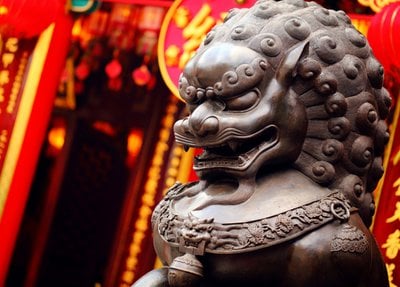China isn't happy with how a lot of U.S. companies do business in their country, and has become much less shy about showing it.
The most alarming example was on July 28, when nearly 100 Chinese government investigators raided four offices of U.S. software giant Microsoft Corp. (Nasdaq: MSFT).

Without warning, the agents from China's State Administration for Industry and Commerce (SAIC) showed up and proceeded to copy financial records and download sensitive data from the company's servers. They also questioned the company vice president as well as other senior managers.
The reason?
Last year Chinese regulatory authorities dug up a 2008 antimonopoly law and started using it as a club on both U.S. and other foreign companies to encourage them to cut the prices they charge to Chinese customers. Since last year dozens of companies from the United States, Japan, and Germany have come under investigation from Chinese regulators for breaking the antimonopoly law.
Whether a violation of the law occurred or not doesn't seem to matter.
And few companies bother to fight back because, well, in China you can't. The court system, controlled by the Communist Party, has little sympathy for foreign corporations.
China's Crackdown Hits Tech, Autos, Big Pharma
So far, China's crackdown seems mostly focused on three sectors: tech, autos, and pharmaceuticals.
In addition to Microsoft, tech companies that China has targeted include San Diego-based Qualcomm Inc. (Nasdaq: QCOM), and Delaware-based InterDigital Inc. (Nasdaq: IDCC).
Last year, China conducted raids on several Big Pharma companies, including Novartis AG (NYSE ADR: NVS), AstraZeneca Plc. (NYSE ADR: AZN), and Eli Lilly and Co. (NYSE: LLY).
And in some cases China has put real bite in its bark. Several GlaxoSmithKline Plc. (NYSE ADR: GSK) executives were charged with bribery in May following a lengthy government investigation.
The latest group to be targeted has been automakers. Last week China announced that both Audi AG Vormals (OTCMKTS: AUDVF) and Chrysler would be punished for violating the antimonopoly law.
The investigations had the desired effect. Both companies announced price cuts, as have several other automakers, including Toyota Motor Corp. (NYSE ADR: TM) and Honda Motor Co. Ltd. (NYSE ADR: HMC).
It's a chilling trend for multinational companies, who have watched their profits from China grow along with the Asian giant's economy.
The government arm-twisting has already slammed GlaxoSmithKline, as its China revenue plummeted 61% in the third quarter last year.
Unfortunately for U.S. companies, the Chinese government has plenty of incentives to maintain this policy of harassment - and may even ramp it up in the months ahead.
Why China Will Keep Hammering U.S. Companies
While U.S. investors could get hurt as companies with operations in China lose profits and revenue, for the Chinese government there are only benefits, and no downside to the antimonopoly crackdown.
"This is about China's ruling elite consolidating power on behalf of the Chinese Communist Party," said Money Morning Chief Investment Strategist Keith Fitz-Gerald.
He said forcing foreign companies to reduce prices provides several key payoffs for the Chinese government.
"It demonstrates that the 'Party' has forced powerful Western influences to bend to its will," Fitz-Gerald said. "And China's political elite also need the lower prices because it keeps consumption high, and, more importantly, will keep the Chinese economy moving. The last part is really the linchpin, because if the economy stops, then revolution starts - and that's the one thing, above all else, China doesn't want."
The Chinese have defended this policy by pointing out that many foreign companies charge more for their products in China than they do elsewhere. The same 16 GB iPhone 5C, for example, costs $549 in the U.S., but $730 in China - a 33% difference.
Companies don't argue that point, but say a variety of factors, such as high real estate and an array of taxes, increase their costs in China.
Needless to say, the Chinese government is unsympathetic.
And it's likely that the trend will accelerate. For one thing, it's been wildly successful.
But the crusade against so-called foreign monopolies is also part of a turf war within the Chinese regulatory system.
Three agencies play a role in enforcing the 2008 law, and each sees victories against foreign companies as a way to enhance their power and reputation within the complex Chinese bureaucracy.
This is an increasing risk to doing business in China, and one that all investors - as well as any multinational company - need to keep on their radar screen.
Follow me on Twitter @DavidGZeiler.
UP NEXT: Some multinationals in China are having problems even without the Chinese government harassing them. Trouble with a Chinese food distributor is one reason why McDonald's (NYSE: MCD) stock is sinking...
Related Articles:
- The New York Times: China's Energetic Enforcement of Antitrust Rules Alarms Foreign Firms
- The Wall Street Journal: China Using Antimonopoly Law to Pressure Foreign Businesses
- Financial Times: Multinationals Fret as China's Antimonopoly Probes Intensify
About the Author
David Zeiler, Associate Editor for Money Morning at Money Map Press, has been a journalist for more than 35 years, including 18 spent at The Baltimore Sun. He has worked as a writer, editor, and page designer at different times in his career. He's interviewed a number of well-known personalities - ranging from punk rock icon Joey Ramone to Apple Inc. co-founder Steve Wozniak.
Over the course of his journalistic career, Dave has covered many diverse subjects. Since arriving at Money Morning in 2011, he has focused primarily on technology. He's an expert on both Apple and cryptocurrencies. He started writing about Apple for The Sun in the mid-1990s, and had an Apple blog on The Sun's web site from 2007-2009. Dave's been writing about Bitcoin since 2011 - long before most people had even heard of it. He even mined it for a short time.
Dave has a BA in English and Mass Communications from Loyola University Maryland.



